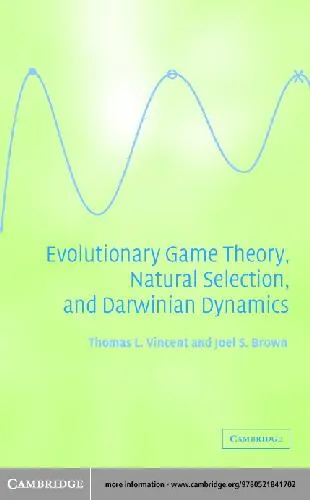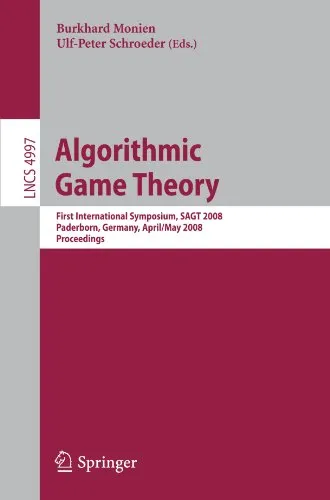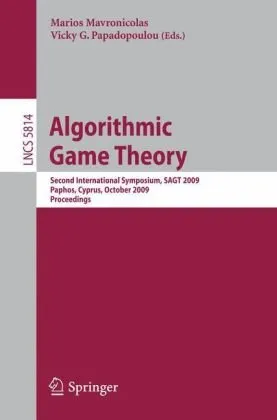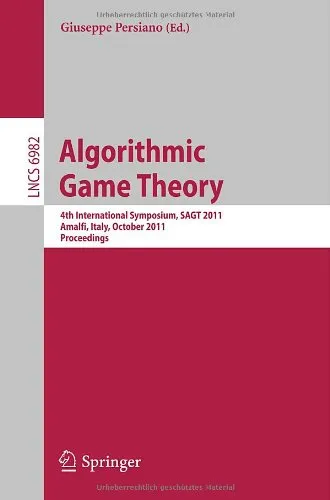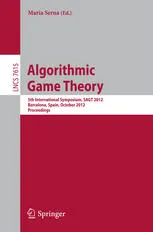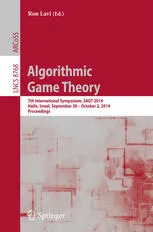Evolutionary Game Theory, Natural Selection, and Darwinian Dynamics
4.5
Reviews from our users

You Can Ask your questions from this book's AI after Login
Each download or ask from book AI costs 2 points. To earn more free points, please visit the Points Guide Page and complete some valuable actions.Related Refrences:
Introduction to "Evolutionary Game Theory, Natural Selection, and Darwinian Dynamics"
The interplay between nature's inherent competition and cooperation has always fascinated scientists, thinkers, and society at large. "Evolutionary Game Theory, Natural Selection, and Darwinian Dynamics" delves deep into these fascinating mechanisms, blending the mathematical elegance of game theory with biological principles of natural selection. This book stands as an extensive guide for those interested in the junction of biology, mathematics, and social science, offering rich insights into how organisms and entities interact with one another within their ecosystems.
Detailed Summary of the Book
"Evolutionary Game Theory, Natural Selection, and Darwinian Dynamics" provides a thorough exploration of how principles of strategy, competition, and cooperation manifest in natural systems. The book unpacks foundational concepts in evolutionary game theory, a discipline that modifies traditional game theory by allowing players to evolve over time based on the success of their strategies. From the simplest hypothetical models to complex real-world ecosystems, the book examines how these theoretical dynamics capture the biological processes of mutation, selection, and adaptation.
The reader is introduced to key theoretical frameworks, including the Prisoner's Dilemma, Hawk-Dove Games, and Nash equilibrium, all within the context of evolutionary biology. Each chapter is crafted to build upon the previous, creating a narrative that appeals to both seasoned scientists and newcomers to the field. Additionally, specific focus is placed on Darwinian dynamics such as survival of the fittest, adaptive behavior, and the emergence of cooperation despite competitive environments.
Central to the book is the idea that evolutionary game theory transcends biology. Examples from economics, sociology, and politics are weaved into the discussion to show how deeply interconnected this theory is with everyday life. By the end, readers gain not just an academic understanding but also a practical appreciation for the mechanisms of interaction and adaptation shaping our world.
Key Takeaways
- Evolutionary game theory explains how organisms strategize and adapt over time based on environmental pressures.
- Critical strategies such as cooperation, competition, and altruism evolve naturally through iterative interactions.
- Game-theoretic models such as the Prisoner's Dilemma and the Stag Hunt shed light on why certain behaviors dominate in populations.
- The book highlights the importance of Darwinian dynamics, including mutation, selection, and adaptation, in shaping life as we know it.
- Applications of evolutionary game theory extend beyond biology—impacting fields like economics, sociology, and organizational behavior.
Famous Quotes from the Book
"In nature, survival is not the only metric of success; cooperation and strategy often guide the evolutionary winners."
"Evolutionary game theory reveals that life's struggle is neither pure chaos nor absolute order—it's a dance between the two."
"Just as in chess, nature's players—organisms—learn from each move, adapting strategies in the pursuit of survival and reproduction."
Why This Book Matters
As we stand at the crossroads of science, technology, and environmental challenges, understanding the principles of interaction and adaptation becomes more vital than ever. "Evolutionary Game Theory, Natural Selection, and Darwinian Dynamics" not only sheds light on biological and ecological processes but also offers frameworks to address pressing global issues. Whether it's tackling climate change, fostering sustainable economies, or fostering cooperation in human societies, the lessons gleaned from this book can be transformative.
By bridging the gap between theory and real-world applications, this book equips its readers with tools to analyze and navigate complex adaptive systems around them. Its interdisciplinary appeal ensures that scientists, economists, policymakers, and even enthusiasts can find value in its pages. Ultimately, this book matters because it helps us make sense of the often enigmatic forces that govern life and interactions on Earth.
Free Direct Download
You Can Download this book after Login
Accessing books through legal platforms and public libraries not only supports the rights of authors and publishers but also contributes to the sustainability of reading culture. Before downloading, please take a moment to consider these options.
Find this book on other platforms:
WorldCat helps you find books in libraries worldwide.
See ratings, reviews, and discussions on Goodreads.
Find and buy rare or used books on AbeBooks.
